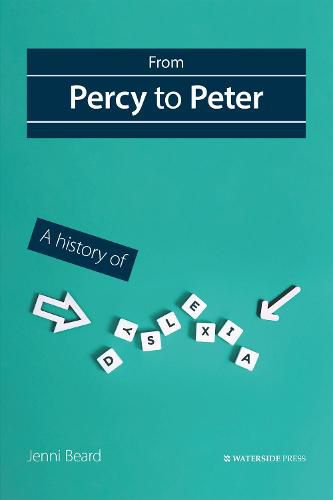Readings Newsletter
Become a Readings Member to make your shopping experience even easier.
Sign in or sign up for free!
You’re not far away from qualifying for FREE standard shipping within Australia
You’ve qualified for FREE standard shipping within Australia
The cart is loading…






This title is printed to order. This book may have been self-published. If so, we cannot guarantee the quality of the content. In the main most books will have gone through the editing process however some may not. We therefore suggest that you be aware of this before ordering this book. If in doubt check either the author or publisher’s details as we are unable to accept any returns unless they are faulty. Please contact us if you have any questions.
Jenni Beard is dyslexic. She discovered this not as a child but after her son Peter was diagnosed with the condition and she noticed “familial’ similarities. She thus writes from a unique and telling standpoint when outlining the much overlooked topic’s history and the controversies which surround it. Sometimes called "word-blindness’ (and also known by other names), there is even today debate about whether dyslexia exists at all, or only in specific (or even individual) forms, or as part of other physical or mental conditions. From Percy to Peter traces these arguments, both historically and, centrally, during, the years of the Word Blind Centre. Skilfully weaving the experience of the dyslexic with the opinions of top diagnostic experts and opinion formers, Jenni Beard supports her wide-ranging survey of dyslexia with a wealth of facts, anecdotes and extracts from learned writings. The book takes the reader inside the mind of those who wrestle with reading or writing in a way that leads to better understanding. Percy was the first child to be diagnosed as dyslexic and his name has become a byword for insiders. By linking the subject to her own (and her son Peter’s) experiences she helps to explain matters to ordinary readers. Among topics included are: the pioneers and their work; ways of overcoming dyslexia; and the debates, papers, books and magazines around what has sometimes been wrongly dubbed a "middle-class disease’, or one with links to brain damage or madness. Written from a highly informed personal standpoint the book brings a neglected topic to life.
$9.00 standard shipping within Australia
FREE standard shipping within Australia for orders over $100.00
Express & International shipping calculated at checkout
This title is printed to order. This book may have been self-published. If so, we cannot guarantee the quality of the content. In the main most books will have gone through the editing process however some may not. We therefore suggest that you be aware of this before ordering this book. If in doubt check either the author or publisher’s details as we are unable to accept any returns unless they are faulty. Please contact us if you have any questions.
Jenni Beard is dyslexic. She discovered this not as a child but after her son Peter was diagnosed with the condition and she noticed “familial’ similarities. She thus writes from a unique and telling standpoint when outlining the much overlooked topic’s history and the controversies which surround it. Sometimes called "word-blindness’ (and also known by other names), there is even today debate about whether dyslexia exists at all, or only in specific (or even individual) forms, or as part of other physical or mental conditions. From Percy to Peter traces these arguments, both historically and, centrally, during, the years of the Word Blind Centre. Skilfully weaving the experience of the dyslexic with the opinions of top diagnostic experts and opinion formers, Jenni Beard supports her wide-ranging survey of dyslexia with a wealth of facts, anecdotes and extracts from learned writings. The book takes the reader inside the mind of those who wrestle with reading or writing in a way that leads to better understanding. Percy was the first child to be diagnosed as dyslexic and his name has become a byword for insiders. By linking the subject to her own (and her son Peter’s) experiences she helps to explain matters to ordinary readers. Among topics included are: the pioneers and their work; ways of overcoming dyslexia; and the debates, papers, books and magazines around what has sometimes been wrongly dubbed a "middle-class disease’, or one with links to brain damage or madness. Written from a highly informed personal standpoint the book brings a neglected topic to life.